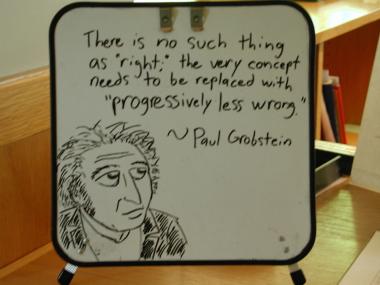April 27, 2017 - 09:59
 "People in our culture, by and large, tend to presume that someone, somewhere knows what is "right," and that each individual's task is either to be that particular someone or to work as hard as they can to learn from that someone what "right" is ... the mindset long predates science as a social activity, but ... science certainly encourages it, and so it is appropriate that science should contribute to correcting it ... In an enormous variety of distinct fields of inquiry the same general pattern is becoming clear: there is no such thing as "right," the very concept needs to be replaced with "progressively less wrong." The difference is far from semantic. "Right" is measured by proximity to some fixed idea, "progressively less wrong" by how far people have gotten from where they started. It is the aspiration to be "right" that leads to rigid hierarchical social organizations of all kinds, including educational systems. Wanting to be "progressively less wrong" takes one (and societies) in quite different directions entirely: it encourages life-long inquiry by every individual, a respect for past wisdom and enthusiasm for contributing to future understanding, and an appreciation of the enormous value of interactions between unique individuals each of whom has unique perspectives to contribute." - Paul Grobstein, 1993
"People in our culture, by and large, tend to presume that someone, somewhere knows what is "right," and that each individual's task is either to be that particular someone or to work as hard as they can to learn from that someone what "right" is ... the mindset long predates science as a social activity, but ... science certainly encourages it, and so it is appropriate that science should contribute to correcting it ... In an enormous variety of distinct fields of inquiry the same general pattern is becoming clear: there is no such thing as "right," the very concept needs to be replaced with "progressively less wrong." The difference is far from semantic. "Right" is measured by proximity to some fixed idea, "progressively less wrong" by how far people have gotten from where they started. It is the aspiration to be "right" that leads to rigid hierarchical social organizations of all kinds, including educational systems. Wanting to be "progressively less wrong" takes one (and societies) in quite different directions entirely: it encourages life-long inquiry by every individual, a respect for past wisdom and enthusiasm for contributing to future understanding, and an appreciation of the enormous value of interactions between unique individuals each of whom has unique perspectives to contribute." - Paul Grobstein, 1993
"It has taken me years of practice, and years of unlearning, to admit that it is not my business to be right, but that I must instead strive to be less wrong, for as things are, there is no better method. To assume the opposite, to believe that what we know now is the only immutable Truth, is to invite catastrophe. In science there are few hard truths, and we should never learn anything more if we ceased to question what we know." - Elizabeth Diamond, 2006
